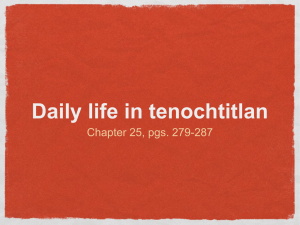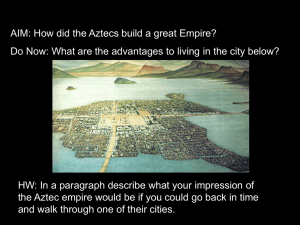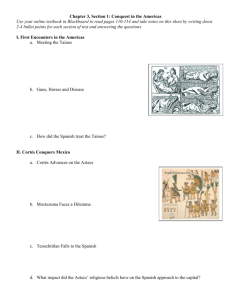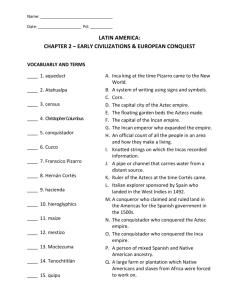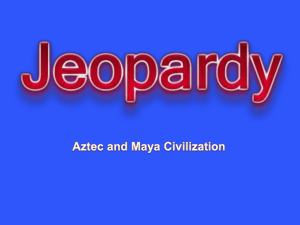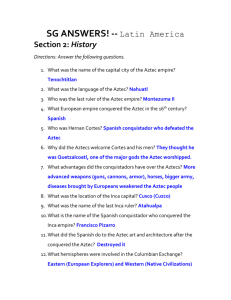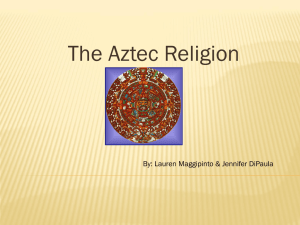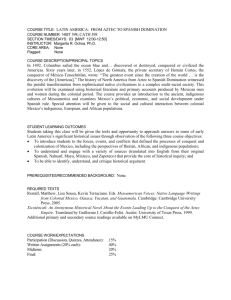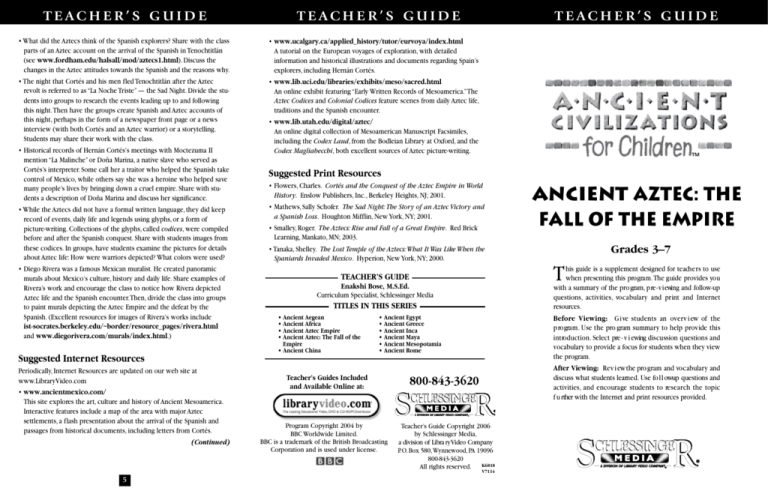
TEACHER’S G UIDE
TEACHER’S GUI DE
• What did the Aztecs think of the Spanish explorers? Share with the class
parts of an Aztec account on the arrival of the Spanish in Tenochtitlán
(see www.fordham.edu/halsall/mod/aztecs1.html). Discuss the
changes in the Aztec attitudes towards the Spanish and the reasons why.
• www.ucalgary.ca/applied_history/tutor/eurvoya/index.html
A tutorial on the European voyages of exploration, with detailed
information and historical illustrations and documents regarding Spain’s
explorers, including Hernán Cortés.
• The night that Cortés and his men fled Tenochtitlán after the Aztec
revolt is referred to as “La Noche Triste” — the Sad Night. Divide the students into groups to research the events leading up to and following
this night.Then have the groups create Spanish and Aztec accounts of
this night, perhaps in the form of a newspaper front page or a news
interview (with both Cortés and an Aztec warrior) or a storytelling.
Students may share their work with the class.
• www.lib.uci.edu/libraries/exhibits/meso/sacred.html
An online exhibit featuring “Early Written Records of Mesoamerica.”The
Aztec Codices and Colonial Codices feature scenes from daily Aztec life,
traditions and the Spanish encounter.
• Historical records of Hernán Cortés’s meetings with Moctezuma II
mention “La Malinche” or Doña Marina, a native slave who served as
Cortés’s interpreter. Some call her a traitor who helped the Spanish take
control of Mexico, while others say she was a heroine who helped save
many people’s lives by bringing down a cruel empire. Share with students a description of Doña Marina and discuss her significance.
• While the Aztecs did not have a formal written language, they did keep
record of events, daily life and legends using glyphs, or a form of
picture-writing. Collections of the glyphs, called codices, were compiled
before and after the Spanish conquest. Share with students images from
these codices. In groups, have students examine the pictures for details
about Aztec life: How were warriors depicted? What colors were used?
• Diego Rivera was a famous Mexican muralist. He created panoramic
murals about Mexico’s culture, history and daily life. Share examples of
Rivera’s work and encourage the class to notice how Rivera depicted
Aztec life and the Spanish encounter.Then, divide the class into groups
to paint murals depicting the Aztec Empire and the defeat by the
Spanish. (Excellent resources for images of Rivera’s works include
ist-socrates.berkeley.edu/~border/resource_pages/rivera.html
and www.diegorivera.com/murals/index.html.)
TEACHER’S G UIDE
• www.lib.utah.edu/digital/aztec/
An online digital collection of Mesoamerican Manuscript Facsimiles,
including the Codex Laud, from the Bodleian Library at Oxford, and the
Codex Magliabecchi, both excellent sources of Aztec picture-writing.
TM
Suggested Print Resources
• Flowers, Charles. Cortés and the Conquest of the Aztec Empire in World
History. Enslow Publishers, Inc., Berkeley Heights, NJ; 2001.
• Mathews, Sally Schofer. The Sad Night: The Story of an Aztec Victory and
a Spanish Loss. Houghton Mifflin, New York, NY; 2001.
• Smalley, Roger. The Aztecs: Rise and Fall of a Great Empire. Red Brick
Learning, Mankato, MN; 2003.
• www.ancientmexico.com/
This site explores the art, culture and history of Ancient Mesoamerica.
Interactive features include a map of the area with major Aztec
settlements, a flash presentation about the arrival of the Spanish and
passages from historical documents, including letters from Cortés.
(Continued)
T
his guide is a supplement designed for teach e rs to use
when presenting this pro gra m .The guide provides yo u
with a summary of the pro gram, p re - v i ewing and follow-up
questions, activities, vo c abulary and print and Internet
resources.
TEACHER’S GUIDE
Enakshi Bose, M.S.Ed.
Curriculum Specialist, Schlessinger Media
TITLES IN THIS SERIES
• Ancient Aegean
• Ancient Africa
• Ancient Aztec Empire
• Ancient Aztec: The Fall of the
Empire
• Ancient China
• Ancient Egypt
• Ancient Greece
• Ancient Inca
• Ancient Maya
• Ancient Mesopotamia
• Ancient Rome
Before Viewing: G i ve students an overv i ew of the
p ro gra m . Use the pro gram summary to help provide this
introduction. Select pre - v i ewing discussion questions and
vocabulary to provide a focus for students when they view
the program.
Teacher’s Guides Included
and Available Online at:
Program Copyright 2004 by
BBC Worldwide Limited.
BBC is a trademark of the British Broadcasting
Corporation and is used under license.
After Viewing: Rev i ew the pro gram and vo c abulary and
discuss what students learned. Use fo l l ow-up questions and
activities, and encourage students to re s e a rch the topic
f u rther with the Internet and print resources provided.
800-843-3620
Teacher’s Guide Copyright 2006
by Schlessinger Media,
a division of Libra ry Video Company
P.O. Box 580, Wynnewood, PA 19096
800-843-3620
All rights reserved. K6818
V7114
5
Grades 3–7
• Tanaka, Shelley. The Lost Temple of the Aztecs:What It Was Like When the
Spaniards Invaded Mexico. Hyperion, New York, NY; 2000.
Suggested Internet Resources
Periodically, Internet Resources are updated on our web site at
www.LibraryVideo.com
Ancient aztec: The
fall of the empire
Historical Overview
Over 550 years ago, the Aztecs controlled a strong and wealthy empire across
the re gion of present-day Mex i c o .The capital city,Tenochtitlán, was the focal
point of an ex p a n s i ve trading netwo rk and government as well as the re l igious and spiritual center of the empire .All this ch a n ged, howeve r, with the
arri val of Spanish conquistadors, led by Hernán Cort é s , in 1519. Seeking to
acquire wealth and land for Spain and to conve rt native peoples to
Christianity, Cortés fo rmed alliances with the T l a x c a l a n s , enemies of the
Aztecs, and fought for control of Tenochtitlán, then ruled by Aztec Empero r
Moctezuma II. In 1520, the Spanish tempora ri ly re t reated after an Aztec
revo l t , but within a year they laid siege to Tenochtitlán. In 1521, the Aztec
E m p i re fell. Cortés claimed the re gion in the name of Spain, and the Spanish
d e s t royed Aztec buildings and conve rted the Aztecs to Christianity. Spanish
priests wo rked to translate Aztec c o d i c e s, or collections of picture wri t i n g .
To d ay in Mex i c o , the Aztecs live on through arch a e o l o gical art i fa c t s , art,
music, dance, crafts, food and the Nahuatl-speaking descendants.
codices — The collective term given to the painted manuscripts depicting
Aztec culture and history, produced before and after the Spanish conquest.
7. How did Moctezuma II die?
Diego Rivera — (1886–1957) A famous Mexican artist who created
panoramic murals of Mexican culture, history and daily life.
9.What is a siege? How long did the siege of Tenochtitlán last?
Time Line
11.Why did monks and priests come to New Spain?
1492
Christopher Columbus lands in the West Indies
1519
Hernán Cortés arrives in Mexico, allies with the Tlaxcalans
and meets Aztec Emperor Moctezuma II
1520
Cortés takes Moctezuma II prisoner;Aztecs revolt against
the Spanish, who flee Tenochtitlán; Moctezuma II is killed
May 1521
Cortés and his allies lay siege to Tenochtitlán
August 1521
The Spanish defeat the Aztecs, leading to the fall of the
Aztec Empire
Pre-viewing Discussion
Vocabulary
Aztecs — An indigenous Central American people who established an
advanced civilization and powerful empire in the area of present-day Mexico
that existed for approximately two centuries before the Spanish arrival in
1519.
Lake Texcoco — A lake in central Mexico with small islands, one of which
became the Aztec capital,Tenochtitlán.Today, Mexico City covers Lake
Texcoco.
Tenochtitlán — The island-city capital of the Aztec Empire.
Moctezuma II — Ruler of the great Aztec Empire and city of Tenochtitlán
until Spanish conquistadors, led by Hernán Cortés, imprisoned him in 1520.
Quetzalcóatl — The Aztec god of wind, morning and life.
Hernán Cortés — (1485–1547) Conquistador, or Spanish explorer, best
known for conquering the Aztec Empire and claiming its lands and wealth
for Spain.
Tlaxcalans — A Native American people who allied with the Spanish
against the Aztecs.
• Locate Mexico and Spain on a world map. Inform students that the video
will convey information about the Aztec people and their encounter with
Spanish conquistadors, or explorers. Encourage students to share what
they know about the Spanish arrival and exploration of the Americas. From
the map, have students trace possible routes of the explorers.What landforms would they need to travel over to reach Tenochtitlán (present-day
Mexico City)?
• For the Aztecs, the goal of battles was often not to destroy the enemy but
instead to integrate their community into Aztec society and thus expand
the empire.Warriors from defeated tribes were often sacrificed in religious
ceremonies.As a class, discuss how other tribes may have felt about the
Aztecs. Share ideas about the pros and cons of belonging to the Aztec
Empire.
• Ask students to imagine what it would have been like to be an explorer in
the 16th century.What challenges did the explorers face? What thoughts
may have gone through their heads? What could they hope to gain as a
result of their journeys? Did the rewards balance the hardships?
causeway — A raised roadway across a body of water.
Focus Questions
siege — A blockade of a city or a fortified building that compels the
inhabitants to surrender.
1.Why did the Aztecs, including Moctezuma II, believe that their god
Quetzalcóatl would return?
New Spain — Lands claimed by Spain during the European settlement of
the New World, encompassing Mexico, parts of the U.S., and parts of South
America.
2.What were the objectives or goals of Hernán Cortés and his men?
convert — To change someone’s beliefs (often religious beliefs).
5. How did Moctezuma II greet Hernán Cortés? Why?
monastery — A place where communities of monks vow to live and
practice their religion.
(Continued)
6. How did the Spanish soldiers react to life in Tenochtitlán?
2
3.What did the Tlaxcalans offer the Spanish?
4.Why was Tenochtitlán difficult to attack?
(Continued)
3
8.Why did Cortés and his men leave Tenochtitlán in July 1520?
10.What happened to the Aztec people after the fall of the empire?
12.What were the Aztec codices?
Follow-up Discussion
• Review the interactions between the Aztecs and the Spanish.Why did
Cortés come to Mexico? How did the Aztecs react to the Spanish? How
did Cortés feel about the Aztecs? Discuss the challenges the conquistadors faced and the actions they took.Were they reasonable or unfair?
• Discuss why the Tlaxcalans agreed to ally with the Spanish.Ask students
whether they believe the alliance was in the Tlaxcalans’ best interest.
Invite students to share what they think would have happened if the
Spanish had lost to the Tlaxcalans.
• Discuss Moctezuma II’s position and actions regarding Cortés and the
Spanish soldiers.Was he right to invite the Spanish into the city? Have
students discuss how the Aztec people may have felt about the emperor
after the Spanish arrived.
• Discuss the legacy and accomplishments of the Aztecs. Had the empire
not fallen to the Spanish, what do students think would have happened
to the Aztec civilization?
Follow-up Activities
• Encourage students to research the myths and legends around the Aztec
god Quetzalcóatl. Students can retell the stories aloud or create graphic
versions of the legends. Invite students to research and review Aztec
depictions of Quetzalcóatl from the codices.
• Cortés and his men landed on the coast of Mexico and had to travel
inland to reach Tenochtitlán. Have students research the geography,
climate, and plant and animal life of the region.Through what kind of
terrain did the Spanish travel? Ask students to write a journal entry as
soldiers traveling over this great distance on foot or horseback.
Encourage them to describe what the journey was like, what the
soldiers saw and how they felt.
• What was life like at Moctezuma’s palace? Share with students an
excerpt from Bernal Diaz’s eyewitness account The True History of the
Conquest of New Spain (1560) describing an imperial feast at
Moctezuma’s court (See www.ancientmexico.com/content/
documents/aztec_imperial_life.htm).What kinds of special treatment
did Moctezuma receive from his people? Have students create pictures
or paintings to depict the scene.
(Continued)
4

